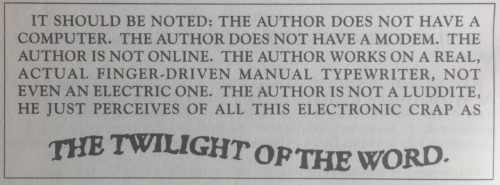Man alive, what a book. I’m all shook up.
My Elvis Blackout by Simon Crump, handed to me as if it were a woodland dirtybag, by my good friend unclef, is a novel about the King of Rock and Roll. Well, sort of.
It’s properly hilarious, experimental and odd. The violence that characterises the book is bewildering and sometimes even upsetting (as when Elvis tortures some Vietnam vets with fishing hooks) but is largely Viz-like knockabout joy.
Barbara Cartland staggered out in front of us again and this time we got the bitch exactly square-on. I felt a sickening, thrilling jolt of malevolent teenage delight as her misshapen, shrivelled old body bounced off the windshield straight into the path of a monster truck which had sharpened electrified spikes protruding from every one of its fourteen greasy axles.
The appearance of “real life” personalities is wonderful too. As well as the Barbara Cartland bit here is one of my faveys:
He called up Roy Orbison, who he’d recorded with in the early days when they were both still signed to Sam Phillips’s Sun label.
Roy was down on his luck as well. He’d been showing off in front of his few remaining fans. He’d written his name in lighter fluid on a glass-topped coffee table, set it afire and burned his house down. His second wife, Claudette, had run off with one of the firemen, and his second daughter who was passing by on her motorcycle had been so distracted by the blaze that she’d ridden straight into a tree and broken her back in three places. His dog had just died and ten minutes before Elvis called him up, Roy had found out that he only had six months to live, plus he’d worn dark glasses for so long that the skin on the bridge of his nose had grown around them so he couldn’t take them off now, even if he wanted to. On top of all that, he was flat broke.

